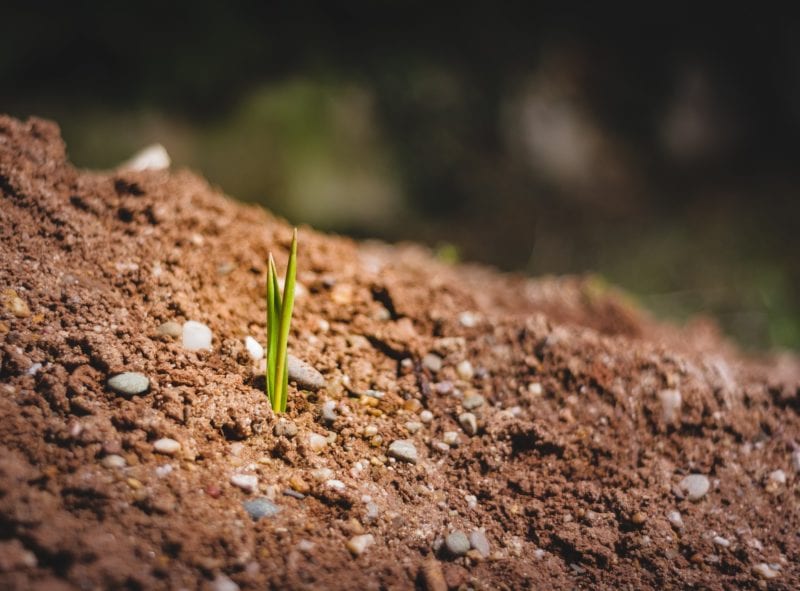The garden should shine in a natural green. To grow, your plants need not only water, but also nutrients. These you need to supply with a fertilizer.
Not always there is bright sunshine. Especially in spring, the weather is changeable and rain could dominate for a few weeks. Is it worth applying the fertilizer even during the bad weather or should you rather wait for the sunshine?
Contents
Why you need to fertilize the lawn
The lawn is actually not one of the demanding plants. Nevertheless, it needs enough nutrients to grow optimally. If the soil does not have the nutrients, there is a risk that weeds will crowd out the lawn. Clover or moss make their way into the lawn, as these are even more undemanding and cope better with poor conditions. Over time, larger and larger gaps result and it is hardly possible to remove the weeds. Only with an aggressive moss killer you get to grips with these weeds and protect your lawn.
In order to promote the growth of the lawn, it is advisable to apply a suitable lawn fertilizer at the beginning of the season. Various fertilizers are available for this purpose. The following nutrients should be included in the fertilizer:
- Nitrogen
- Magnesium
- Phosphorus
- Potassium
The good news is that you don’t need a separate fertilizer for each active ingredient. Most fertilizers rely on a combination, which provide all-around care for the lawn. Various liquid fertilizers are available for this purpose. In liquid form, you simply pour this over the soil with a watering can and provide the much-needed nutrients.
Fertilizing should take place at least once at the beginning of the lawn season. Shortly after seeding the lawn is a good time to apply the fertilizer. After a few weeks, the lawn should have grown in all its glory.
If you discover bare patches in the meantime or if the lawn turns yellow, you can give it another helping hand with the fertilizer. However, keep the dose lower to avoid overfertilizing. The positive effect should come quickly and the lawn will again have perfect health.
In addition to the fertilizers that can be purchased, you can also use a natural fertilizer. For this purpose, it is convenient if you create a wooden composter in the garden. There you put old plant residues, and over time you will get nutrient-rich organic residues that you can use to fertilize the lawn.
What effect does rain have on fertilizing?
The weather has an important influence on your gardening activities. For example, you should avoid watering the lawn during the midday heat. The heat causes the water to evaporate more quickly and is hardly absorbed by the plants.
There is also the limitation that fertilizing is not possible in all weather conditions. If you apply a granular fertilizer on your lawn, you should make sure that it is neither too hot, nor too rainy.
After all, with the water is not as clear as with the heat. After applying the fertilizer, it is recommended to water the lawn lightly. This allows the fertilizer to get into the soil better and is more easily absorbed by the plants. Therefore, on dry days you will have to help yourself and do a short watering of the area.
If you want to avoid this extra work, you can apply the lawn fertilizer when rain has been announced. This way you do not have to water the lawn yourself, but the precipitation will support you in your work.
However, be careful if the soil is too wet or a heavy rainfall continues. Then there is a risk that the fertilizer will simply seep into the groundwater or be washed away. It will not be absorbed by the soil and the nutrients will not reach the plant.
The best time to fertilize

When fertilizing you need to make sure that it is not too warm, nor announced a heavy rain. But a little moisture is quite beneficial and helps the fertilizer to penetrate into the soil.
The best time to spread the fertilizer is a dry evening when rain has been announced for the following night. This allows you to easily apply the fertilizer and you do not have to do the watering yourself. Your workload is conceivably small and, with a bit of luck, the rain will occur as desired.
To have a greater probability of success, it is a good idea to install a weather station in the garden. This continuously measures the air pressure and is thus independently able to make a weather forecast. This will give you very accurate information on how the weather will change in your garden.
Fertilize the lawn when it rains
For optimal growing conditions, it is worth fertilizing the lawn in the spring. For this purpose, multi-component fertilizers are already available, which contain all the necessary nutrients.
In order for the fertilizer to be absorbed by the soil in the best possible way, some moisture is an advantage. On dry days, you will have to help out yourself by watering the soil lightly.
If you would prefer not to do this extra work, fertilize the lawn when a light rain is imminent. Apply the fertilizer on the dry eve and hope that the promised rain will start. Then the fertilizer will get into the soil better and the lawn will be better cared for.
However, avoid fertilizing when the soil is already wet or it is raining. Then the fertilizer will be washed away or seep directly into the groundwater without being absorbed by the soil.
For the best possible effect of the fertilizer, the weather conditions are crucial and fertilizing during the rain should be avoided.

